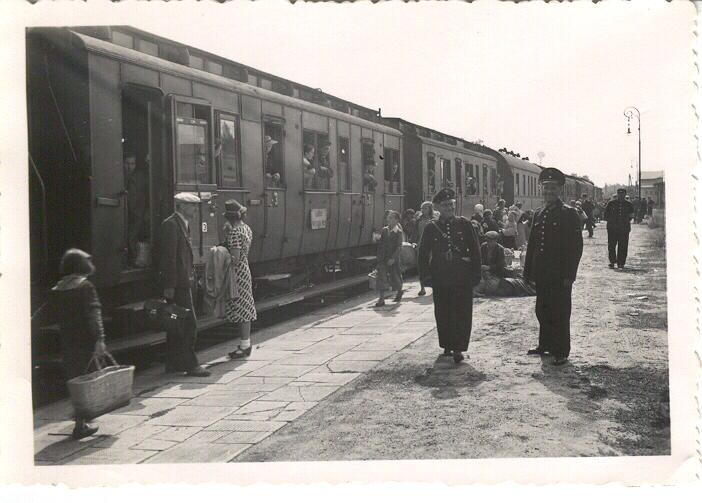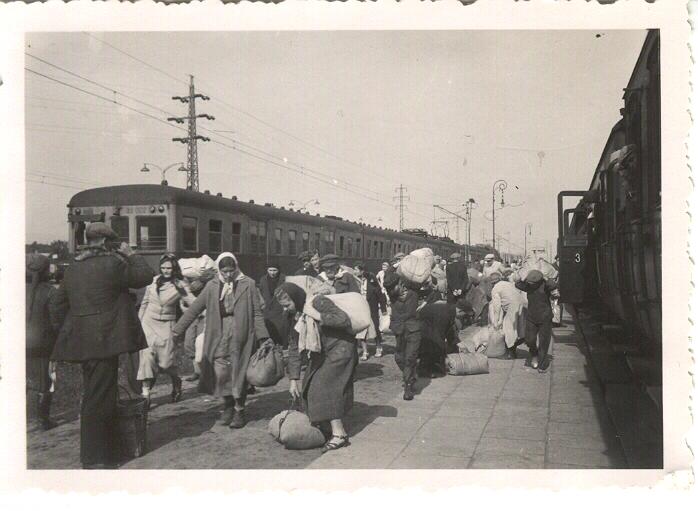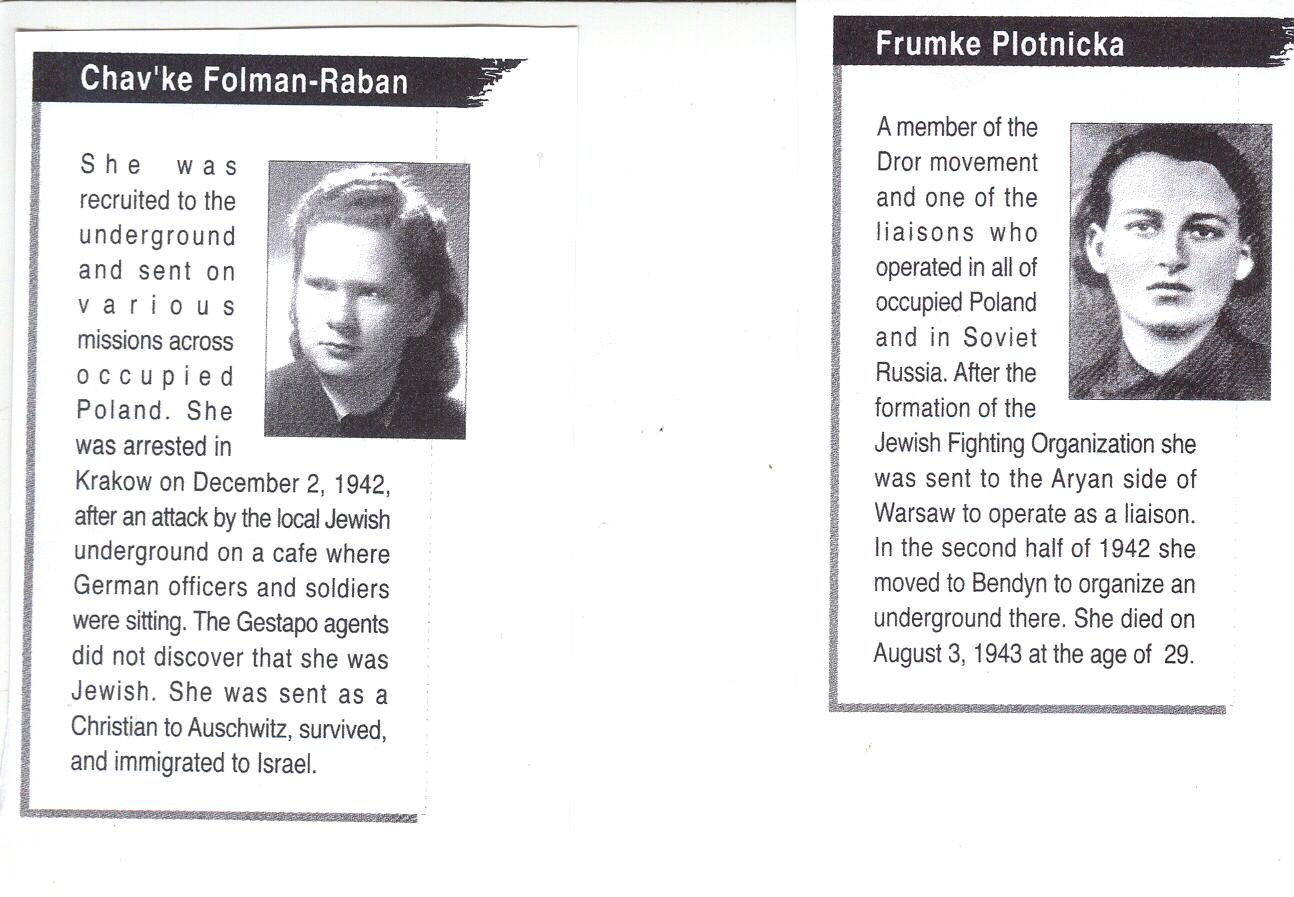Holocaust Education & Archive Research Team |
Revolt & Resistance
Acts of Resistance
Jewish Resistance
Groups Jewish Resistors Allied Reports Anti-Nazi Resistance Nazi collaborators
| ||
Jewish Resistance
Frumke Plotnicka and Chajke Grossman
Emanuel Ringelblum’s account of these two girls from Inside the Ghetto
The heroic girls, Chajke and Frumke – they are a theme that calls for the pen of a great writer.
Boldly they travel back and forth through the cities and towns of Poland. They carry “Aryan” papers identifying them as Poles or Ukrainians. One of them even wears a cross, which she never parts with except when in the Ghetto. They are in mortal danger every day. They rely entirely on their “Aryan” faces and on the peasant kerchiefs that cover their heads.
Without a murmur, without a second’s hesitation they accept and carry out the most dangerous missions. Is someone needed to travel to Vilna, Bialystok, Lemberg, Kowel, Lublin, Czestochowa, or Radom to smuggle in contraband such as illegal publications, goods, money?
The girls volunteer as though it was the most natural thing in the world. Are there comrades who have to be rescued from Vilna, Lublin or some other city?
They undertake the mission. Nothing stands in their way, nothing deters them. Is it necessary to become friendly with engineers of German trains, so as to be to travel beyond the frontiers of the Government- General of Poland, where people can move with special papers?
They are the ones to do it, simply without fuss, as though it was their profession. They have travelled from city to city, to places no delegate or Jewish institutions had ever reached, such as Wolhynia, Lithuania. They were the first to bring back the tidings about the tragedy of Vilna.
They were the first to offer words of encouragement and moral support to the surviving remnant of that city. How many times have they looked death in the eyes? How many times have they been arrested and searched?
Fortune has smiled on them. They are in the classic idiom, “emissaries of the community to whom no harm can come”. With what simplicity and modesty have they reported what they accomplished on their journeys, on the trains bearing Polish Christians who have been pressed to work in Germany.
The story of the Jewish woman will be a glorious page in the history of Jewry during the present war. And the Chajkes and Frumkes will be the leading figures in this story. For these girls are indefatigable.
Just back from Czestochowa, where they imported contraband, in a few hours they’ll be on the move again. And they’re off without a moment’s hesitation, without a minute of rest.
A detailed report now follows of one such mission to Hrubieszow
On 1 June 1942, in an attempt to make contact with the Jews of Hrubieszow, two girls from the Warsaw ghetto, Frumka Plotnicka, of whom Ringelblum had written with such admiration, and Hava Follman, by removing their armbands, bribing the ghetto policeman, procuring forged travel papers, and with considerable personal courage, took the train eastwards.
At some junctions it stopped for up to ten hours. Each time it stopped, their documents were examined, but without incident.
Hava Follman’s own account continues: On approaching Hrubieszow, we became aware of an unusual commotion; big crowds were gathered on the platform. Unsuspecting, we alighted at the station. But we soon learned that the thousands herded there were Jews; men and women, old and young, children pressed among bundles of household effects; cries and shouts of the Germans.
Four stout, red-faced Germans, arms bare, gallop on horseback along the platform, ply their whips ceaselessly, tread on whomever they find in their way, vent their wrath on mothers holding babies in their arms.
A huge German, with the face of a murderer, leads off four youths clad in kapotes. Their faces are frozen; a few meters from the window of the waiting room where Frumke and I took refuge, they are ordered to dig. They are urged along with a whip: “Quickly, we have no time!”
A few minutes later, four shots are heard, and again the whip is used on those who are bidden to fill in the open grave.
Suddenly a horrible scream of a woman is heard, followed by a shot. A woman with a baby in her arms keels over. She wanted to throw the baby over the fence, in the hope that it would be spared. But a moment later she and the baby are trodden to death by the horses’ hoofs.
A deadly silence descends on the platform. I hold fast to the window-sill; I feel terrible dizzy. We start walking into town. The road is crowded with carts bearing old and sickly people who are unable to walk to their destination. They are guarded by Ukrainian police.
We are allowed to look our fill. Only a trifle is required of us; a smiling face! Are we not supposed to be true Goyim and is not spring in the air?
We go through well- known lanes and streets, we reach the house of Aaron Frumer, where we used to meet frequently. The door to his flat is wide open, the floor is littered with all sorts of household objects, but not a living soul in sight.
Where to now? In the centre of the town two Germans walk, preceded by a group of Gentile boys. The Germans carry axes, the boys are leading them to a house, where Jews are hiding.
In order not to draw attention to ourselves, we quicken our pace in the direction of the church. There Frumke stays behind and I make a short tour. In a shop I learn that the Jewish youth has been concentrated back of the town. They are intended for the labour camps, whilst the ‘rubbish’ will go elsewhere.
This remark by my informant is accompanied by a sly smile, which I have to return in kind. Despite my efforts, we could not reach our comrades, and as there was no train to Warsaw until eight the following morning, we had to spend the night at the hotel.
We pass the inspection of the hotel-keeper satisfactorily and are given a room. Needless to say, we passed a sleepless night. Early in the morning another inspection is thorough; the policemen are not quite convinced, and we are ordered to report later in the day at the police station.
We decide that we cannot risk another inspection. We check out and find our way to the station by devious ways. If we succeed in reaching Warsaw, we intend to return and try again to contact our friends.
A ‘special’ train stands on the platform, filled to overflowing with Jews. The platform is strewn with bundles, pillows, prams, pots and pans.
A number of Gentile boys are waiting: as soon as the train streams out, they will appropriate the loot. Hava Follman and Frumke Plotnicka reached Warsaw safely, and made their report.
Unknown to them the Jews whom they had seen being deported that day were sent from Hrubieszow to Sobibor, 3400 in all (among them were also the Jews from Dubienka, Uchanie, Grabowiec and Belz. Together with them were deported too hundreds of the Jews who several weeks before were resettled from Mielec to Hrubieszow), followed a week later by a further two thousand
Among these deportees was the fifteen year-old Yaakov Biskowitz. From the transport of 3400 only twelve were selected for work. Biskowitz and his father among them. They were put to work as carpenters. From this transport was also selected to work Eda Lichtman who survived Sobibor.
All the other Hrubieszow deportees were gassed in Camp 3 Frumke Plotnicka – was a member of the Dror movement and one of the liaison members who operated in all of occupied Poland and in the Soviet Union.
After the formation of the ZOB she went to the Aryan side of Warsaw to operate as a liaison officer. In the second half of 1942 she moved to Bedzin to organise an underground force there.
She was discovered in a cellar on 3 August 1943 in Bedzin, and was killed armed only with a hand- gun, aged 29 years old.
Chajke Grossman /Hava Follman was recruited to the Jewish Underground and was sent out on various missions across occupied Poland.
She was arrested in Krakow on 2 December 1942, after an attack by the local Jewish underground on a café where German officers and soldiers were sitting. The Gestapo agents did not discover she was Jewish. She was deported as a Christian to Auschwitz concentration camp.
She survived and went to Israel.
Sources:
The Holocaust by Sir Martin Gilbert, published by Collins London 1986
Brave and Desperate by Ilan Kfir, Danny Dor, Chava Biran published by Beit Lohamei Haghetaot / Ghetto Fighters House Museum*& Second Generation of the Holocaust and the Uprising - USA and Israel
Ringelblum, Emmanuel. Notes from the Warsaw Ghetto: The Journal of Emmanuel Ringelblum, Schocken Books, New York, 1974
Copyright SJ H.E.A.R.T 2007
|


